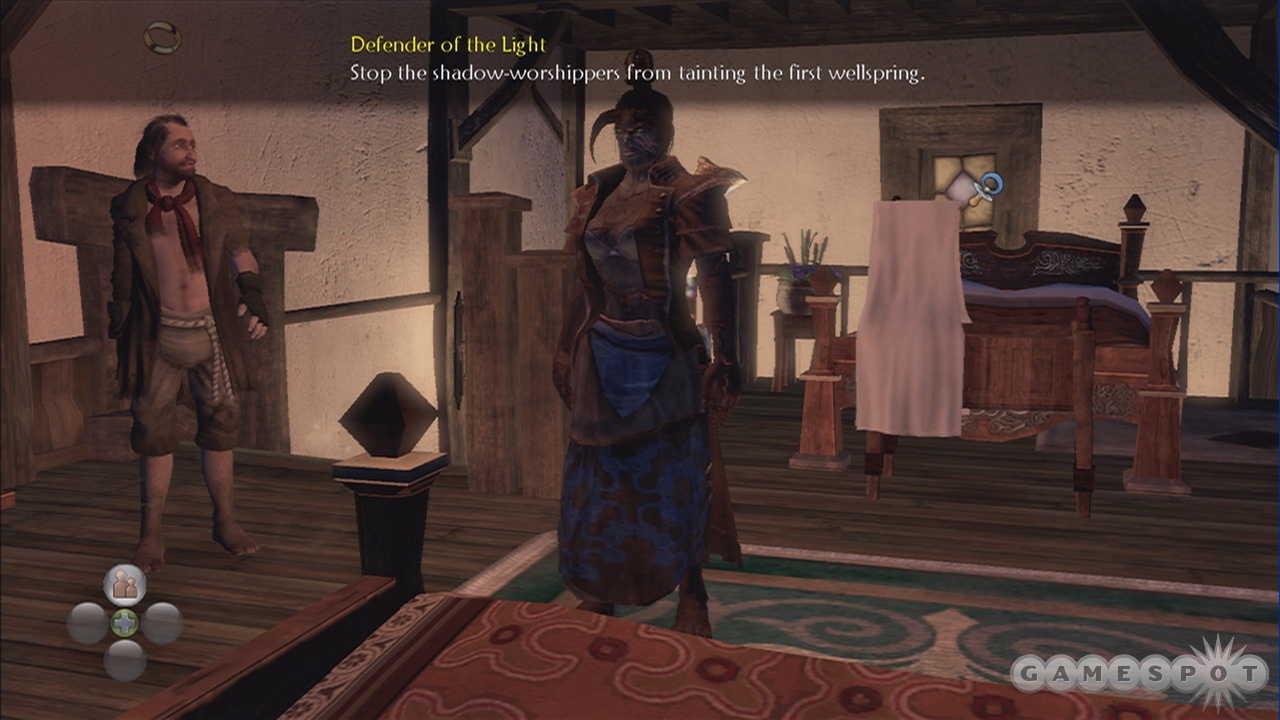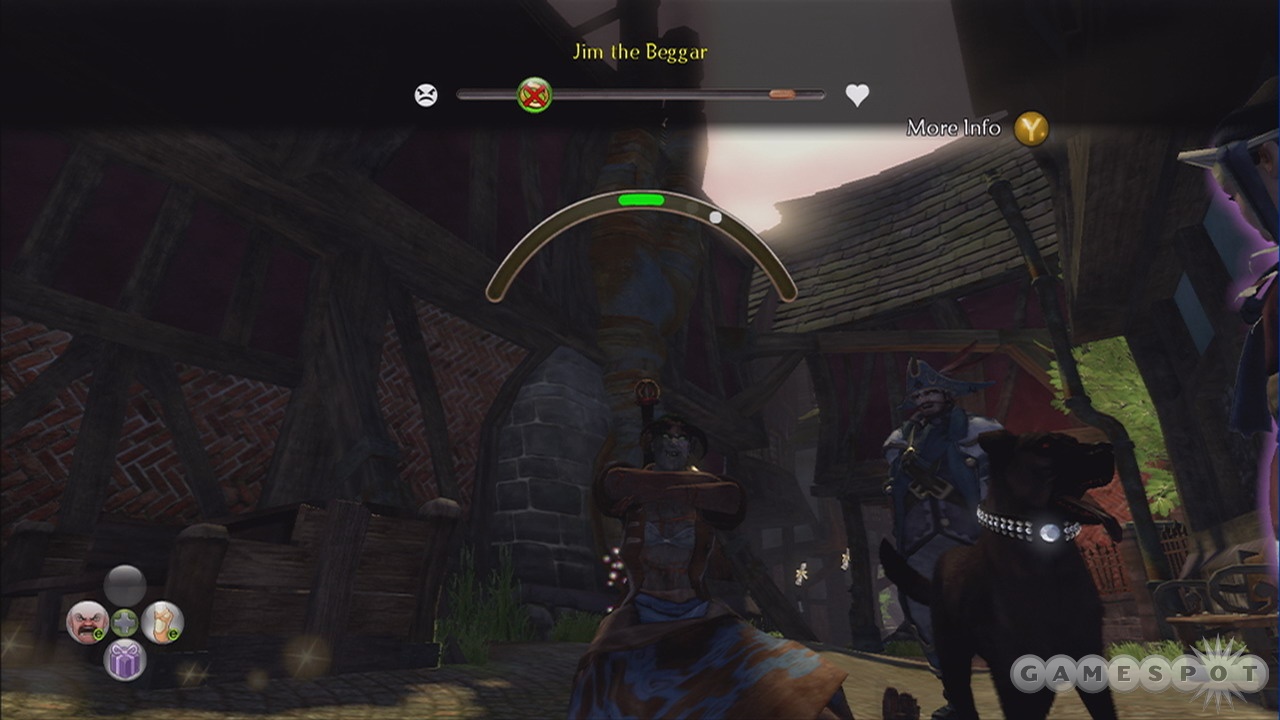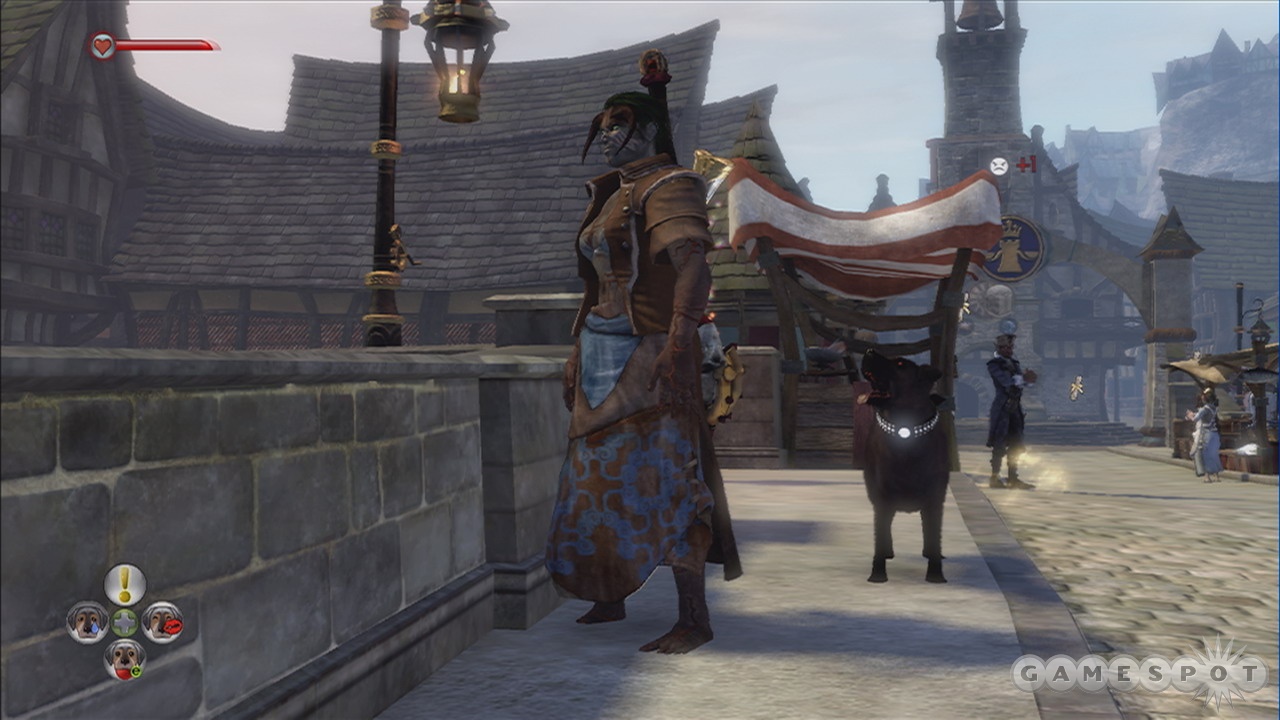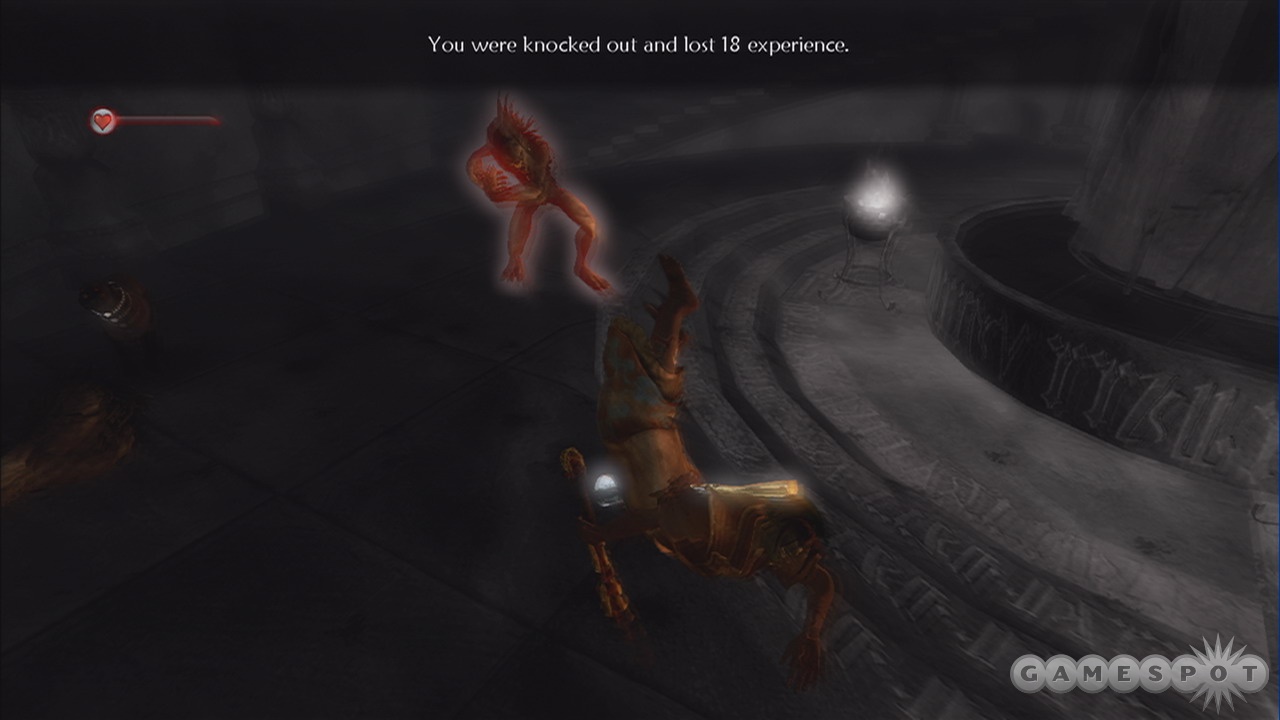Albion is a world that's extremely difficult to pull away from once you get tangled up in its charmingly irresistible net. In Fable II's magical land, you'll come across crass gargoyles mocking your foul-smelling breath, nasty trolls erupting from the middle of luscious green pastures, and flirtatious women pleading with the local hero to put a ring on their naked fingers. This is a place that seems to exist whether you're actually playing or not, which makes it all the more compelling when you become one of its virtual citizens. The simple combat and predictable story make the early moments feel slight--as if the whole adventure will lack the depth needed to truly suck you into its spell. But once your initial doubt fades away, you're left with a meticulously crafted world that demands exploration, makes you laugh out loud, and urges you to experience all the incredible details waiting to be discovered.

Fable II starts when you're just a small child. Although your childhood doesn't follow the typical RPG path of burned homes and murdered parents, it encompasses a unique tragedy that provides the backbone for the rest of your adventure. Your path is one of vengeance; you'll spend the journey recruiting fellow heroes as you attempt to destroy the ultimate evil threatening Albion. The story is one of the weakest aspects because it focuses on your choices without creating interesting characters of its own, but it does provide a few powerful scenes. There is one section in which your morality will be put to the test, and the severity of your choices is on full dramatic display. During another scene, you're given a glimpse at the main character's fondest dreams, and the simple yearnings combined with the enchanting visuals leave a lasting impression.
The lack of meaningful character interaction and development is the reason the story often falls flat. Key moments are acted out in monologue form, where one character will babble on about your destiny while you silently listen. It's unfortunate that you cannot give your character a voice during the adventure. Your interaction with others is confined to a series of expressions that help you convey your feelings but provide little actual discourse. While it is certainly amusing using these often lewd expressions to get your point across, it decreases your attachment to the rest of the world. It's hard not to laugh when you perform an elaborate hand-puppet display as your wife storms out of your house, but because the citizens of Albion are pretty one dimensional, it's difficult to get really attached to any of them.
Human interaction seems to exist solely to provide laughs, though there is one emotional link to Albion that is quite powerful. You have a loyal dog that will follow you everywhere. His main role is that of a furry metal detector, barking excitedly whenever he spots a treasure. His need to alert you of hidden goods before you have a chance to find them for yourself takes away some of the thrill of discovery, but it's hard to be mad at him when he rolls on his back or chases his tail. You can comfort your dog when something scares him, play fetch using a rubber ball, and even teach him tricks from dog-training books. It may not seem like much, but you’ll definitely miss him and his antics when he’s gone. For instance, your dog will sometimes choose a safer way down a cliff rather than jump from a great height into a pool of water; in other cases, when you come across a treasure chest for the first time without your dog happily pointing it out beforehand, you'll feel his absence and anxiously wait for him to join you again.

Even though you can't speak, you can choose how to interact with the people of Albion. Just because you're a hero, it doesn't mean you have to act like one. Pillaging towns, buying stores just so you can mark up the prices, and selling innocent people to greedy slavers are memorable diversions on your path toward saving the world. Just like in real life, it's much easier to get noticed if you're being particularly rude rather than behaving like a civilized person. And it's much more rewarding playing the part of uncouth barbarian rather than lovable purveyor of justice. If you do go down the dark path, you'll be laughing the whole time. The morality choices aren't balanced, though. During our experience, we were able to max out our evil and corrupt status after only a few hours, whereas becoming completely good and pure when playing as a noble do-gooder took much longer. Adding more overtly good choices could have made a second play-through completely different. You'll still want to try playing from both perspectives, but you'll run into a lot of the same situations.
Aside from randomly terrorizing anyone you encounter, there are actual quests to embark on as well. These will send you all over Albion, through dark caves dotted with phosphorescent mushrooms to foggy swamps teeming with undead creatures. You are often asked to kill a certain group of foul creatures that are making life unpleasant for those not accustomed to coexisting with banshees or trolls. Other times, you'll have to perform a more delicate task that places the moral burden on you. During one early quest, a ghost petitions you to court the woman who broke his heart. You are asked to make her fall in love with you, and after she consents to be your wife, you're supposed to hand her a ghost-written note that lambasts her for her youthful follies--breaking her heart in the process. Of course, you don't have to follow the orders of a ghost. Moral conundrums like these keep the quests unpredictable. The mission types are plentiful and varied. You'll need only complete a small percentage to compete the game, so there's plenty of reason to return after you finish.
There are also job openings scattered throughout the towns in Albion. These range from simple rhythm games, such as chopping wood, to deeds only a willing hero can perform, such as saving a town from ravenous balverines. Odd jobs provide the best source of income during the early goings of your adventure, but before long, you'll discover that the monetary system in Albion doesn't always make sense. If you purchase a store or rent out a home, you will receive money every five minutes. It's wise to invest money in small businesses early, watch your wallet grow while you embark on various quests, and use your newfound wealth to buy even more properties. The problem is that you earn that commission every five minutes, whether you're actually playing or not. If the world of Fable II were persistent, changing during your time away from the game, this would make sense. But in its current form, the only thing that changes between your playtimes is how much money you have, which quickly makes currency meaningless. Since you're able to buy most weapons and properties by just waiting around for a few minutes once you're established, there’s little sense of accomplishment in buying the item you’ve been pining for.

The combat is a blast once you learn how to take advantage of your various moves. You have three basic attacks to mess around with: melee, magic, and ranged. Though it is certainly possible to finish the game focusing on just one or two of these techniques, choosing that method will make the combat repetitive and far too simple. The key to getting the most out of combat in Fable II is to utilize all three styles, mixing up your attacks to keep enemies on their toes and, even more importantly, keep fights interesting. Magic will often slow down attackers, shocking them with lightning or freezing them in place. Melee attacks are the most powerful, letting you aggressively take on pursuers before they have a chance to damage you, but you'll put yourself in dangerous situations if you rush right in to every fight. Ranged weapons can take down a foe waiting in ambush or cleave through an enemy who is content to block your melee attacks. And if you knock an enemy on his back, your dog will join in the fight. Mixing up your moves is quite satisfying, letting you plow through enemies in a variety of ways. The more moves you earn, the more engaging the combat gets, which makes it fun to kill more enemies just to see what else you can add to your repertoire.
The problem with the combat in Fable II is the lack of an adequate punishment system. When you lose all of your health, the color fades away and you are forced to watch your hero's dying gasps in slow motion. Within five seconds, you'll be back on your feet, fighting the same enemies who seconds earlier seemed to have ended your life. To give you an idea of how insignificant your own death is, your dog won't even notice your pain. The only deterrent that might make you fear death is battle scars you receive every time you fall. These scars are permanent, negatively affecting your attractiveness level for the rest of the game. While this is an interesting concept, the execution is ineffectual. If you play as an evil character, you're going to turn out ugly anyway, so the scars add another layer of scary imagery to your dark persona. A good hero may not want a scarred face, but people will still love you when you perform valiant deeds. Thus, the slap-on-the-wrist punishment system removes the fear of death.
The lure of the unknown will draw you through every inch of this well-constructed world. The various treasures scattered around the fields are the most obvious reason to leave the beaten path, but charming visuals provide their own reward. The diversity of the environments makes scouting out every nook and cranny well worth the extra effort. Once you learn how to manually aim your gun, you'll be able to hunt down rude gargoyles that taunt you when you walk beneath them. These tricky creatures can be hard to spot, but they add another dose of humor and reason for exploring this fantastic world. There are a few problems, though, that can make exploration annoying at times. The map is pretty useless, which means you'll have to rely on an optional glowing trail to avoid getting lost. Also, it's not always easy to tell which parts of the environment you can walk up and which require a detour. These are small issues, though. Finding buried treasures and new areas is one of the most rewarding aspects of Fable II.

Albion does look really impressive. The world has a cartoony feel, which gives personality to the characters and environments. The changing weather effects are quite stunning. The noon sun makes way for an unrelenting downpour, soaking you and your poor dog as you search for a snickering gargoyle. Though there are a number of technical problems, such as people walking through each other or the excruciating load times between areas, Albion is such a charming place that you'll want to see every hidden thing. The music also sets the mood of the varied environments quite nicely. The serene strings of the grassy plains clash wonderfully with the eerie howl from the foggy swamps. The voice acting is also well done. Listening to the goofy observations of the citizens, who will happily mock your clothing to your face or shout marriage proposals from across the courtyard, keeps Fable II funny and inviting the whole way through.
It's hard not to get sucked into Fable II. The world is so charming and your choices so profound, that it's easy to look past the game's shortcomings. The punishment for death is pointless and the story carries little weight, but the experience is still immensely rewarding. It's easy to lose hours to trivial tasks, and discovering all the secrets tucked away creates a truly memorable adventure. The new ideas presented here may not change the future of gaming, but there are some noteworthy additions that make this feel completely unique. Your emotional attachment to your virtual dog will be real, making you reliant upon his companionship as you trek through these lands. In a game about choices, the wisest one you can make is to play the game. After spending a few hours in Albion, you won't want to do anything else.
Editor's Note: Though this review was written after playing a retail copy of Fable II, there was no online co-op support available at the time of writing. Microsoft plans to make this feature available in a free update on the same day that the game arrives in stores.